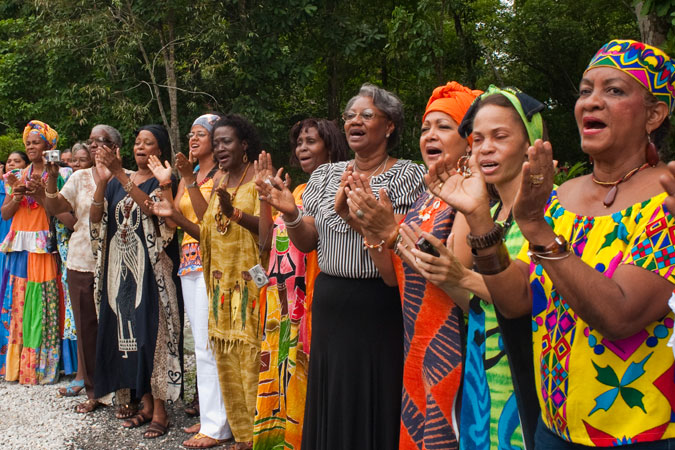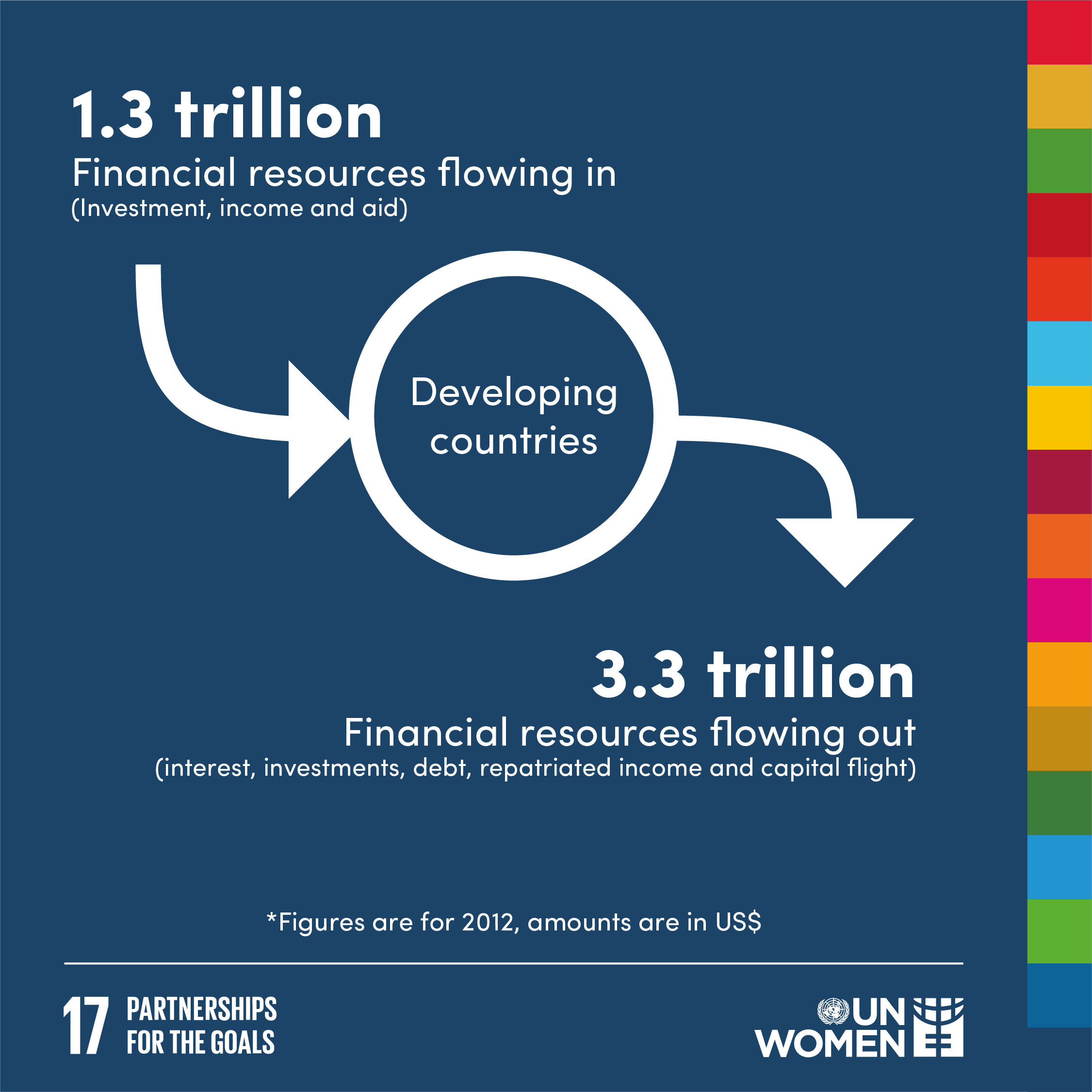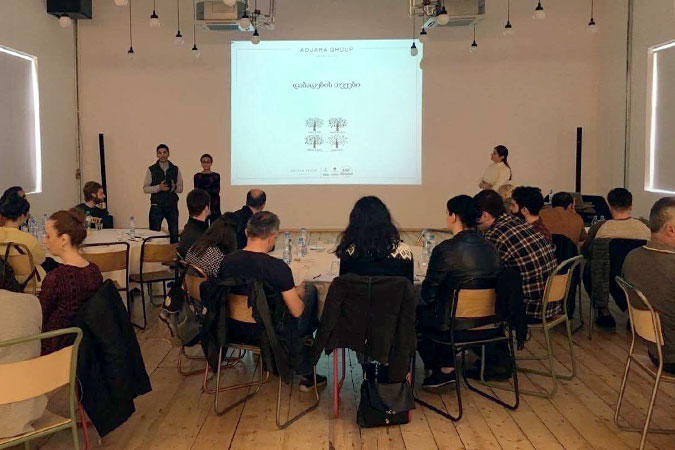SDG 17: Strengthen the means of implementation and revitalize the Global Partnership for Sustainable Development (original) (raw)

Photo: UN Women/Fernando Bocanegra
Targets
Finance
Strengthen domestic resource mobilization, including through international support to developing countries, to improve domestic capacity for tax and other revenue collection.
Developed countries to implement fully their official development assistance commitments, including the commitment by many developed countries to achieve the target of 0.7 per cent of ODA/GNI to developing countries and 0.15 to 0.20 per cent of ODA/GNI to least developed countries ODA providers are encouraged to consider setting a target to provide at least 0.20 per cent of ODA/GNI to least developed countries.
Mobilize additional financial resources for developing countries from multiple sources.
Assist developing countries in attaining long-term debt sustainability through coordinated policies aimed at fostering debt financing, debt relief and debt restructuring, as appropriate, and address the external debt of highly indebted poor countries to reduce debt distress.
Adopt and implement investment promotion regimes for least developed countries.
Technology
- Enhance North-South, South-South and triangular regional and international cooperation on and access to science, technology and innovation and enhance knowledge sharing on mutually agreed terms, including through improved coordination among existing mechanisms, in particular at the United Nations level, and through a global technology facilitation mechanism.
- Promote the development, transfer, dissemination and diffusion of environmentally sound technologies to developing countries on favourable terms, including on concessional and preferential terms, as mutually agreed.
- Fully operationalize the technology bank and science, technology and innovation capacity-building mechanism for least developed countries by 2017 and enhance the use of enabling technology, in particular information and communications technology.
Capacity building
- Enhance international support for implementing effective and targeted capacity-building in developing countries to support national plans to implement all the sustainable development goals, including through North-South, South-South and triangular cooperation.
Trade
- Promote a universal, rules-based, open, non-discriminatory and equitable multilateral trading system under the World Trade Organization, including through the conclusion of negotiations under its Doha Development Agenda.
- Significantly increase the exports of developing countries, in particular with a view to doubling the least developed countries’ share of global exports by 2020.
- Realize timely implementation of duty-free and quota-free market access on a lasting basis for all least developed countries, consistent with World Trade Organization decisions, including by ensuring that preferential rules of origin applicable to imports from least developed countries are transparent and simple, and contribute to facilitating market access.
Systemic issues
Policy and institutional coherence
- Enhance global macroeconomic stability, including through policy coordination and policy coherence.
- Enhance policy coherence for sustainable development.
- Respect each country’s policy space and leadership to establish and implement policies for poverty eradication and sustainable development.
Multi-stakeholder partnerships
- Enhance the global partnership for sustainable development, complemented by multi-stakeholder partnerships that mobilize and share knowledge, expertise, technology and financial resources, to support the achievement of the sustainable development goals in all countries, in particular developing countries.
- Encourage and promote effective public, public-private and civil society partnerships, building on the experience and resourcing strategies of partnerships.
Data, monitoring and accountability
- By 2020, enhance capacity-building support to developing countries, including for least developed countries and small island developing States, to increase significantly the availability of high-quality, timely and reliable data disaggregated by income, gender, age, race, ethnicity, migratory status, disability, geographic location and other characteristics relevant in national contexts.
- By 2030, build on existing initiatives to develop measurements of progress on sustainable development that complement gross domestic product, and support statistical capacity-building in developing countries.
![]()
Success on the SDGs depends on sufficient means to implement them, underpinned by a strong commitment to solidarity and cooperation.

Finance, fair and equitable trade, technology, capacities, partnerships and data are among the primary tools for achieving gender equality and all other dimensions of sustainable development. They define, for instance, whether or not services are provided to reduce women’s burden of unpaid care and improve their access to decent work.
Increased mobilization of financial resources to fuel sustainable development is a key concern. While 1.3trillioninaid,investmentandincomefromabroadflowedintodevelopingcountriesin2012,2.5timesthat—1.3 trillion in aid, investment and income from abroad flowed into developing countries in 2012, 2.5 times that—1.3trillioninaid,investmentandincomefromabroadflowedintodevelopingcountriesin2012,2.5timesthat—3.3 trillion—flowed out through interest payments on foreign debt, foreign investment, repatriated income and capital flight.
Currently, official development assistance is the only source of finance that can be tracked by gender, but amounts are limited, reaching only about $114 billion in 2014-2015. Around a third of this sum had a gender focus, but investment shares varied, with a marked emphasis on government and civil society, and only marginal attention to women’s roles in the economy.
UN Women acts to put women at the centre of the means of implementation. Globally, we lead the drive to adopt gender-responsive budgeting to realize commitments to women’s rights. We seek to make sure gender issues central to cooperation among countries, and champion innovations in data collection to make women’s issues visible and influential. Helping women access technology achieves a double dividend of empowerment and environmental sustainability.
Stories
From where I stand: “Being a winner is fighting for what you believe in and never giving up”
Micaele Fernandes, 16, is a handball player from Rio de Janeiro. She is a participant in ‘One Win Leads to Another’, a programme to empower young women and girls through sport in Brazil by UN Women and the International Olympic Committee (IOC).
Take five: South-south cooperation, a tool for advancing gender equality and inclusive development
A.H. Monjurul Kabir, Senior Programme Adviser, Head of the Asia-Pacific and Least Developed Countries Section, and UN Women Global Lead on South-South and Triangular Cooperation, talks about why ensuring that gender issues are a central part of cooperation between countries is an under-utilized but powerful vehicle for more inclusive and sustainable development.
In Georgia, businesses step up to support survivors of domestic violence get a fresh start
Every eleventh woman in Georgia has experienced domestic violence. Many of them cannot leave abusive relationships because of financial dependency. The Adjara Group, a signatory of the Women’s Empowerment Principles, an initiative by UN Women and the UN Global Compact, is recruiting survivors and raising awareness to prevent domestic violence.
Notes
UN Women (2018), Turning promises into action: Gender equality in the 2030 Agenda.


